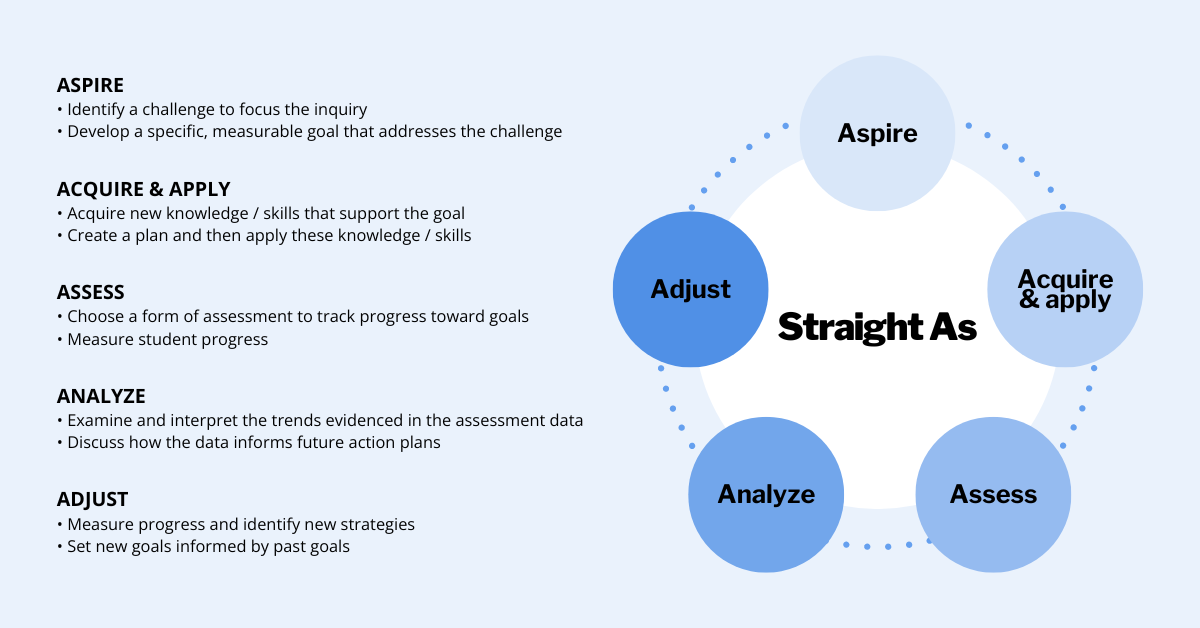|
How one school's teacher leaders are cultivating curiosity and creating a roadmap for meaningful change.
In a recent professional development session at a high school in Georgia, I aimed to enhance a group of leaders' understanding and use of inquiry in their practice. Guiding teacher leaders through an exploration, I encouraged them to reflect on the everyday significance of inquiry within their professional roles, emphasizing its promise in driving practical growth and development. Together, we engaged in a reflective dialogue that included delving into the process of inquiry, unpacking its intended purpose, and highlighting its importance in fostering a culture of continuous improvement within the school community.
The importance of inquiry
What exactly is inquiry, and how does it enhance the work of teacher leaders? Inquiry, simply put, involves deepening understanding through curiosity, questioning, and seeking answers, supported by data analysis. It serves as a means for collaborative exploration, enabling educators to address shared challenges, develop effective strategies informed by data insights, and monitor progress towards common goals. Through this process, teacher leaders not only enhance their own practice, but also foster a culture of evidence-based decision-making within their school communities.
Central to this exploration are inquiry teams, which consist of professionals coming together in their quest for understanding and improvement. These teams operate based on the principle of intentional collaboration, prioritizing issues relevant to their roles and responsibilities. This approach ensures that inquiry projects remain manageable and grounded, enabling teams to achieve tangible outcomes. Moreover, it cultivates a culture of shared responsibility and commitment, fostering an environment that promotes collective growth and progress. Navigating the stages of inquiry
One notable framework that supports inquiry with teacher leadership is our Straight As protocol. This serves as a structured approach for navigating the stages of inquiry, guiding educators through a systematic process of goal setting, knowledge acquisition, assessment, analysis, and adjustment.
Our initial session in Georgia was focused on the Aspire stage, where teacher leaders chose to explore the challenges faced by their students and collaboratively identify SMART goals — goals that are specific, measurable, actionable, relevant, and timely. Teachers identified challenges such as stamina, confidence, literacy, Lexile levels, and more. From there, we analyzed these challenges and attempted to narrow down our list by thinking about which obstacles could be combined, as well as which obstacle(s) felt the most important, the most urgent, or were in a high-leverage area. Through a process of reflection and dialogue, each department gained a clear understanding of their objectives and a roadmap for achieving them.
During our time together, we thoroughly analyzed various SMART goal examples, focusing on key aspects, such as:
We also examined sample inquiry questions, proposed change strategies, and the anticipated timelines. This comprehensive approach aimed to equip teacher leaders with the necessary insights and tools to effectively formulate their own goals. At the end of the day, each department presented their SMART goals for feedback, fostering collaboration and refinement. As a next step, our group of teacher leaders will present these goals to their respective department teams with the hopes of further refinement and integration into a larger inquiry process throughout the semester as we continue our work together.
The process of inquiry provides teacher leaders with a practical approach to deepen their understanding, collaborate effectively, and drive meaningful change within their school communities. By embracing the principles of inquiry and utilizing frameworks like the Straight As protocol, educators can see themselves as catalysts for positive change, enhancing their teaching practices and empowering their students. Moreover, by incorporating data analysis into the inquiry process, educators can make informed decisions based on evidence, thereby increasing the effectiveness of their strategies and interventions.
|
|
The Center for Professional Education of Teachers (CPET) at Teachers College, Columbia University is committed to making excellent and equitable education accessible worldwide. CPET unites theory and practice to promote transformational change. We design innovative projects, cultivate sustainable partnerships, and conduct research through direct and online services to youth and educators. Grounded in adult learning theories, our six core principles structure our customized approach and expand the capacities of educators around the world.
|
ABOUT US
525 West 120th Street, Box 182 New York, NY 10027 416 Zankel Ph: (212) 678-3161 [email protected] Our Team Career Opportunities |
RESOURCES
Professional Articles Ready-to-Use Resources Teaching Today Podcast Upcoming PD Opportunities |
COACHING SERVICES
Custom Coaching Global Learning Alliance Literacy Unbound New Teacher Network Student Press Initiative |



























